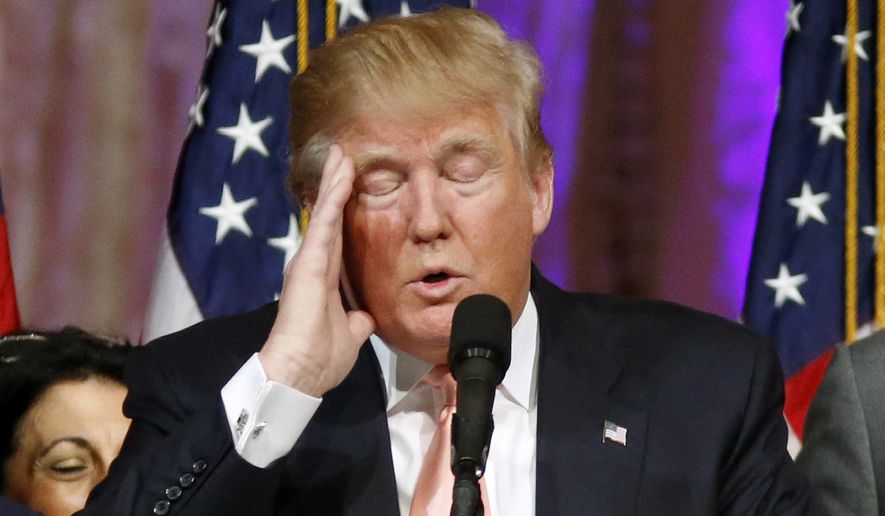Donald Trump boasts that he does “very well” with women at the ballot box, and that’s been the case in most GOP primaries. But the Republican presidential front-runner likely will have much more female trouble in a general election against Hillary Clinton.
Half of U.S. women say they have a “very unfavorable” view of the real estate tycoon, according to Reuters/Ipsos poll released Thursday, up from 40 percent of women who had a very negative view of Mr. Trump in the same poll in October.
Rising anti-Trump sentiment among women would pose a significant threat to Mr. Trump in the general election, when Mrs. Clinton, the likely Democratic nominee, assuredly will play the gender card and tout her ambition to make history by becoming the first female U.S. president.
In a theoretical matchup between the two front-runners, Mrs. Clinton enjoyed a 21-point lead over Mr. Trump among women, while he had only a five-point advantage among men, found a recent ABC News/Washington Post poll.
Early in the primary races, Mrs. Clinton accused Mr. Trump of being a “sexist” and suffered a swift and stinging retaliation from the billionaire businessman and reality TV star.
Mr. Trump responded by calling former President Bill Clinton “one of the great woman abusers of all time” and accused Mrs. Clinton of being “an enabler.” Mrs. Clinton and her campaign abruptly backed off.
A gender gap favoring Democrats among women is typical in U.S. presidential elections, but women have turned out at higher rates than men in every election since 1996, according to the U.S. Census Bureau.
Mr. Trump’s negatives were not nearly as pronounced among men in the Reuters/Ipsos poll, with 36 percent of men saying they have a “very unfavorable” opinion of him, a level that, while high, has held steady in recent months.
Republican women also were less hostile toward Mr. Trump, giving him a roughly 60 percent positive favorability score, according to the poll.
The Trump campaign did not respond to questions about his standing with female voters. Mr. Trump has insisted that he is popular with female voters.
“If you look at women’s polling leaving the booths, I’m leading by a lot, and I’ve done very well with women,” he said earlier this week on ABC News.
He’s also defended himself against repeated charges that he is a misogynist.
“I’m the exact opposite. I cherish women,” Mr. Trump said last year on CNN. “I want to help women. I’m going to do things for women that no other candidate will be able to do. And it’s very important to me.”
It doesn’t help that Mr. Tump is known for making disparaging remarks about women, including calling comedian Rosie O’Donnell a “fat pig” and describing Huffington Post editor Arianna Huffington as “a dog.”
Then there was Mr. Trump’s widely reported feud with Fox News Channel anchor Megyn Kelly, in which he said: “There was blood coming out of her eyes. Blood coming out of her wherever.”
Detractors accused Mr. Trump of making a reference to Ms. Kelly’s menstrual cycle. Mr. Trump denied that was his intention.
Mr. Trump has outperformed his Republican rivals among female voters in most of the primaries and caucuses this year. But he also consistently does better with men.
He also was edged out among female voters by his rivals in recent contests, which followed TV attack ads by the anti-Trump group Our Principles PAC that highlighted his derogatory remarks aimed at women.
Mr. Trump lost the female vote in three of the five primary elections Tuesday, despite only losing overall in Ohio, where Gov. John Kasich captured the largest share of both men and women in his home state, accordion to exit polls.
Mr. Trump lost the female vote to Sen. Ted Cruz in North Carolina, 36 percent to 39 percent, and in Missouri, 38 percent to 43 percent, according to exit polls.
And in the two states where he won the female vote, his support remained significantly higher among men.
In Florida Mr. Trump won 53 percent of male voters and 40 percent of women. In Illinois, Mr. Trump won 43 percent among men and 35 percent among women, according to exit polls.
• S.A. Miller can be reached at smiller@washingtontimes.com.




Please read our comment policy before commenting.